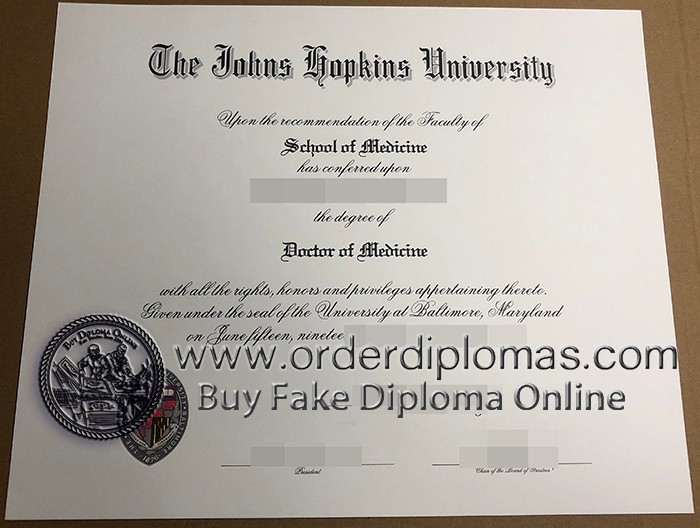
buy fake Johns Hopkins University degree
How to buy a fake Johns Hopkins University degree? how to buy a fake Johns Hopkins University diploma? how to buy a fake Johns Hopkins University certificate? buy fake diploma, buy fake Johns Hopkins University degree, buy fake Johns Hopkins University diploma.
The Johns Hopkins University (Johns Hopkins, Hopkins, or JHU) is a private research university in Baltimore, Maryland. Founded in 1876, Johns Hopkins claims to be the oldest research university in the United States and it consistently ranks among the most prestigious universities in the world.
The university was named for its first benefactor, the American entrepreneur and Quaker philanthropist Johns Hopkins. Hopkins’ $7 million bequest to establish the university was the largest philanthropic gift in U.S. history up to that time. Daniel Coit Gilman, who was inaugurated as Johns Hopkins’s first president on February 22, 1876, led the university to revolutionize higher education in the U.S. by integrating teaching and research. In 1900, Johns Hopkins became a founding member of the American Association of Universities. The university has led all U.S. universities in annual research expenditures over the past three decades.
Johns Hopkins is organized into 10 divisions on campuses in Maryland and Washington, D.C., with international centers in Italy and China. The two undergraduate divisions, the Zanvyl Krieger School of Arts and Sciences and the Whiting School of Engineering, are located on the Homewood campus in Baltimore’s Charles Village neighborhood. The medical school, nursing school, Bloomberg School of Public Health, and Johns Hopkins Children’s Center are located on the Medical Institutions campus in East Baltimore. The university also consists of the Peabody Institute, Applied Physics Laboratory, Paul H. Nitze School of Advanced International Studies, School of Education, Carey Business School, and various other facilities. The university also has graduate campuses in Italy, China, and Washington, D.C.
As of October 2019, 39 Nobel laureates and one Fields Medalist have been affiliated with Johns Hopkins’s faculty and alumni. Founded in 1883, the Blue Jays men’s lacrosse team has captured 44 national titles and plays in the Big Ten Conference as an affiliate member. The university’s other sports teams compete in Division III of the NCAA as members of the Centennial Conference.
On his death in 1873, Johns Hopkins, a Quaker entrepreneur and childless bachelor, bequeathed $7 million (approximately $156.3 million today adjusted for consumer price inflation) to fund a hospital and university in Baltimore, Maryland. At the time, this donation, generated primarily from the Baltimore and Ohio Railroad, was the largest philanthropic gift in the history of the United States, and endowment was then the largest in America. Until 2020, Hopkins was assumed to be a fervent abolitionist, until research done by the school into his United States Census records revealed he claimed to own at least five household slaves in the 1840 and 1850 decennial censuses.
The first name of philanthropist Johns Hopkins comes from the surname of his great-grandmother, Margaret Johns, who married Gerard Hopkins. They named their son Johns Hopkins, who named his own son Samuel Hopkins. Samuel named one of his sons for his father, and that son became the university’s benefactor. Milton Eisenhower, a former university president, once spoke at a convention in Pittsburgh where the master of ceremonies introduced him as “President of John Hopkins.” Eisenhower retorted that he was “glad to be here in Pittburgh.”
The original board opted for an entirely novel university model dedicated to the discovery of knowledge at an advanced level, extending that of contemporary Germany. Building on the Humboldtian model of higher education, the German education model of Wilhelm von Humboldt, it became dedicated to research. It was especially Heidelberg University and its long academic research history on which the new institution tried to model itself. Johns Hopkins thereby became the model of the modern research university in the United States. Its success eventually shifted higher education in the United States from a focus on teaching revealed and/or applied knowledge to the scientific discovery of new knowledge.

 USA Diplomas
USA Diplomas Canada Diplomas
Canada Diplomas UK Diplomas
UK Diplomas Australia Diplomas
Australia Diplomas Germany Diplomas
Germany Diplomas Malaysia Diplomas
Malaysia Diplomas Singapore Diplomas
Singapore Diplomas Other countries
Other countries Transcript-Form.xlsx
Transcript-Form.xlsx
